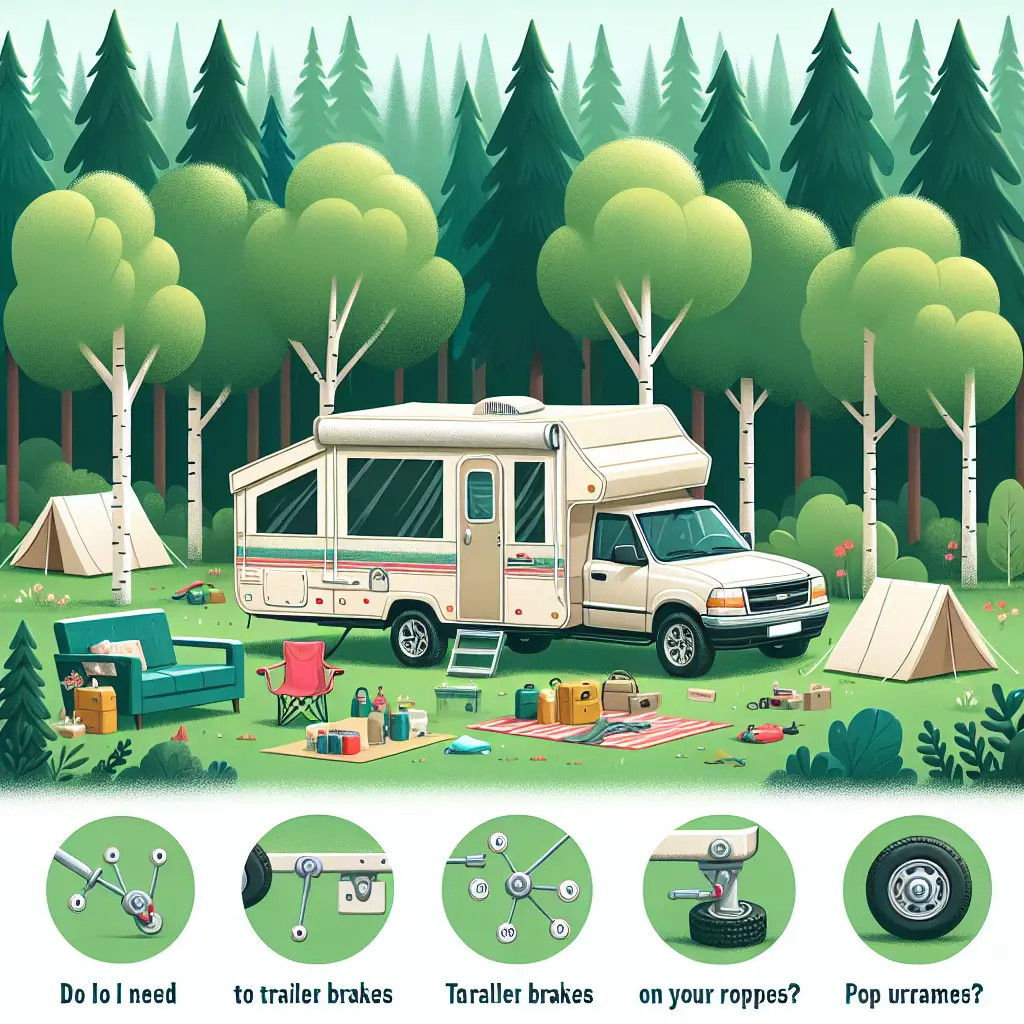Title: Do I Need Trailer Brakes on My Pop-Up Camper?
When it comes to towing a pop-up camper, safety should never take a backseat. One question that recurrently pops up among RV enthusiasts and casual campers alike is, “Do I need trailer brakes on my pop-up camper?” This might seem like a straightforward query, but it actually unpacks a myriad of considerations ranging from legal requirements to towing capacity and safety concerns. This blog post aims to put the brakes on your confusion and steer you into a lane of informed decision-making.
Understand Your Towing Rig
Before diving into the world of trailer brakes, it’s essential to understand the capabilities of your towing vehicle. The weight your vehicle can safely tow (often referred to as towing capacity) is crucial. This information is typically found in your vehicle’s owner’s manual or a manufacturer’s website. Keep in mind that adding trailer brakes can also depend on the weight of your camper and its fully loaded weight, not just its empty weight.
Legal Requirements by State and Country
Now, let’s talk law. The requirements for trailer brakes vary by state and country. In the United States, for example, many states have set specific thresholds for when trailer brakes are required, usually based on the weight of the trailer. According to AAA, some states require trailer brakes on trailers weighing over 1,000 pounds, while others might set this limit at 3,000 pounds or more. Ignoring these laws can lead not only to hefty fines but also to an increased risk of accidents.
For our Canadian road-trippers, Transport Canada is the go-to for federal regulations, and each province may have its own additional rules. It’s your responsibility to ensure you’re compliant not only in your home state or province but in all the regions you’ll travel through.
The Weight of Your Pop-Up Camper
Most pop-up campers weigh between 1,500 and 3,000 pounds (unladen). When dealing with smaller campers on the lighter end, you may not need trailer brakes. However, once you pack your gear, food, water, and other essentials, the weight can escalate quickly, potentially pushing you over the threshold at which brakes become a necessity or legal requirement.
If your pop-up camper is near or above the legal weight limit for your vehicle or the states you are traveling in, it’s wise to invest in a brake system. To get a definitive answer, weigh your fully-loaded camper at a public scale or check the Gross Vehicle Weight Rating (GVWR) of your camper, which is usually listed by the manufacturer.
Safety Considerations
Beyond legalities, safety is paramount. Trailer brakes are not just a matter of adhering to regulations; they are a critical feature that could prevent an accident. The primary function of trailer brakes is to ensure that your trailer can stop effectively without putting undue stress on your towing vehicle’s brakes. This becomes increasingly important in emergency braking situations or while driving downhill.
Having trailer brakes could also prevent a common towing hazard known as ‘trailer sway,’ which can lead to losing control of both your vehicle and the trailer. The peace of mind that comes with having an additional braking system on your trailer is invaluable, especially when you’re out on the road with your family.
Types of Trailer Brakes
Assuming you’re convinced of the merits of trailer brakes, let’s explore the types available:
- Electric Brakes: These are very popular and are activated by a controller in your vehicle, allowing you to adjust the braking intensity. This type of brake requires a vehicle that is pre-wired for towing or the installation of a wiring harness and brake controller.
-
Surge Brakes: These are a hydraulic braking system that is activated by the momentum of the trailer as it pushes against the tow vehicle during deceleration. They are self-contained on the trailer and do not require any electronic controller.
For DIY enthusiasts, installing trailer brakes can be a project, but for most, it’s a task best left to professional mechanics. The importance of proper installation and regular maintenance cannot be overstressed when it comes to brakes.
Financial Factors
There is, of course, the cost aspect to ponder. Adding brakes to your pop-up camper will involve an initial investment. But, when weighed against the potential cost of an accident or traffic fine, many find this cost negligible. Additionally, insurance companies might offer discounts for trailers equipped with brakes, so it’s worth inquiring about this with your provider.
In Conclusion
In the grand scheme of towing a pop-up camper, whether or not to have trailer brakes boils down to a combination of legal requirements, safety protocols, and peace of mind. Always check the specific laws in your area, weigh your camper accurately, and consider the added safety benefits when making your decision.
The next time you’re preparing for a camping adventure, give thought to this aspect of your journey. Ensuring you have the appropriate equipment can make all the difference in creating lasting happy memories or dealing with an unfortunate incident.
For more tips and information about safe towing and maintaining your RV or pop-up camper, stay tuned to our blog where we regularly post updated content for our road-savvy readers.
Remember, safe towing is no accident!
[Disclaimer: This blog post is for informational purposes only and does not constitute legal advice. For specific legal requirements regarding trailer brakes, please consult the appropriate state or provincial transportation authority or a qualified attorney.]

